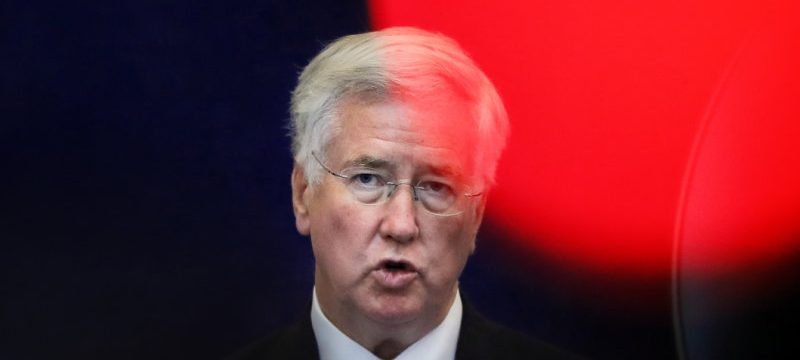London: Britain's former defence secretary has urged Theresa May to delay a final decision on whether Huawei should be allowed to build the 5G network until after a new prime minister and national security team is in place.
Speaking to The Sydney Morning Herald and The Age in London, Sir Michael Fallon- who served as defence secretary under Mrs May and her predecessor David Cameron – said the call was too important to be made in the dying days of the Prime Minister's tenure.
"This isn't the kind of decision that can be left to an outgoing prime minister's wash-up," Sir Michael said.
Former defence secretary Michael Fallon wants the United Kingdom to delay a decision on the 5G mobile network. Credit:AP
Pushing back the final verdict opens the prospect of the United Kingdom reversing course and following Australia's lead in banning the Chinese telecommunications giant from the critical 5G mobile network.
Sir Michael has previously warned that Britain's conservative government would be making a "serious mistake" if it did not heed warnings by its allies Australia and the United States about Huawei.
The two countries have urged Britain to follow their approach in banning Huawei, amid concerns the Chinese government can order a Chinese company to spy on its behalf.
The issue is becoming a front-and-centre topic in the leadership race that will accelerate when Ms May stands down as Tory leader on June 7.
"This is a key strategic security decision for our country and it should be a matter for the new prime minister, the new cabinet and the new security council," Sir Michael stressed on Thursday.
US President Donald Trump and Prime Minister Scott Morrison raised the issue in their one-on-one meetings with Mrs May during visits to London this week.
The Sydney Morning Herald and The Age also revealed Australia has been working behind the scenes to urge the British to follow Australia's lead.
High Commissioner to London George Brandis appeared last month before Britain's high-powered and secretive Intelligence and Security Committee of Parliament. Sources familiar with the private meeting said he made the case that it was better for the so-called "Five Eyes" group of intelligence sharing nations to adopt a united front.
A preliminary decision was taken by the United Kingdom's national security council to allow Huawei to supply so-called non-core parts of the 5G rollout against the wishes of the Foreign, Trade, Defence, Home and International Development secretaries – at least three of whom are also running for the leadership.
The outcome was sensationally leaked, leading to the sacking of defence secretary Gavin Williamson, who denied handing over classified material. Mr Williamson is now co-chairman of the leadership campaign of frontrunner and former London mayor Boris Johnson.
Sir Michael's warning comes after his one-on-one encounters with former Australian prime minister Malcolm Turnbull in March earlier this year, and last week with Mr Trump's national security advisor John Bolton.
It also follows warnings that allowing Huawei into Britain's 5G network could compromise the Five Eyes intelligence-sharing network comprising the US, UK, Australia, Canada and New Zealand.
Mr Turnbull, the first Five Eyes leader to ban Huawei, has been instrumental in lobbying the UK and US in not just advocating a ban but also stressing the need for the West to develop its own technological rival.
The Tory leadership contest will culminate in the week of July 22, when the party selects its new leader who will then take over from Mrs May as prime minister.
One of the candidates, Matt Hancock, delivered a speech in London this week to call on the West to urgently challenge China's dominance in the "technology race" and warn Huawei can't be banned from Britain's 5G rollout unless there is a viable alternative.
The Secretary of State for Health said Britain should lead the West's response to China’s strategy to win the fourth industrial revolution. He said last century's arms race had been replaced by a technology race, which China was so far winning.
"China has a clear and determined strategy. The West does not. And we need one fast," Mr Hancock said.
Source: Read Full Article

